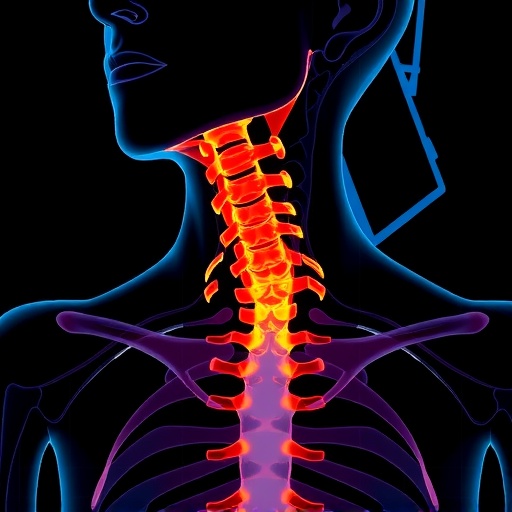
A groundbreaking study published in BMC Cancer has revealed a compelling link between thyroid dysfunction (TD) and the effectiveness of PD-1/PD-L1 inhibitors in patients battling advanced lung cancer. This new research spotlights baseline thyroid-stimulating hormone (TSH) levels as a potent predictor of immune checkpoint inhibitor efficacy, offering a promising biomarker that could revolutionize personalized treatment plans for one of the most aggressive forms of cancer.
Lung cancer remains a leading cause of cancer-related mortality worldwide, with many patients typically diagnosed at an advanced stage when treatment options are limited. Over the past decade, immunotherapy, particularly PD-1 and PD-L1 inhibitors, has emerged as a beacon of hope, fundamentally altering the therapeutic landscape. However, patient responses remain highly variable, prompting scientists to search for biomarkers that can reliably forecast treatment outcomes.
In this retrospective cohort study, researchers compiled an extensive dataset from 120 patients treated for advanced lung cancer between January 2019 and August 2024. These patients were carefully categorized into two groups based on whether they developed thyroid dysfunction during treatment. This stratification enabled an in-depth analysis of the relationship between TD occurrence and progression-free survival (PFS), as well as examination of baseline TSH levels as a predictive factor.
The results were striking. Patients who developed thyroid dysfunction exhibited significantly higher baseline TSH levels compared to their counterparts who did not experience any thyroid irregularities. Notably, the median baseline TSH in the TD group was 2.33 mIU/L, compared to 1.58 mIU/L in the non-TD group, indicating a substantial physiological difference prior to immunotherapy. This finding suggests that subclinical variations in thyroid function could foreshadow treatment-induced immune-related responses.
Equally noteworthy was the dramatic extension in progression-free survival among the TD subgroup. The median PFS measured 7.90 months in patients with thyroid dysfunction, markedly longer than the 4.87 months observed in those without TD. This differential was statistically significant, with a hazard ratio (HR) for disease progression of 0.499, reinforcing the protective association between TD and therapeutic success under PD-1/PD-L1 blockade.
When isolating patients exclusively treated with PD-1/PD-L1 inhibitors, these trends persisted robustly. Baseline TSH levels remained significantly elevated in those who developed thyroid dysfunction (median 2.16 mIU/L versus 1.52 mIU/L), and a similar PFS benefit was maintained (8.83 months versus 6.50 months). This correlation underscores the likelihood of thyroid dysfunction serving as a favorable prognostic biomarker within immunotherapy paradigms.
The mechanistic underpinnings of this association remain a subject of ongoing inquiry. One prevailing hypothesis involves the immune system’s heightened reactivity leading to collateral thyroid gland inflammation, a manifestation of immune-related adverse events. Such immune activation could simultaneously amplify anti-tumor responses, generating an intertwined therapeutic and autoimmune effect. Further research into this delicate immunologic balance could unveil novel strategies to optimize treatment while mitigating toxicity.
Clinicians may soon consider baseline TSH screening as a non-invasive, cost-effective tool to identify patients more likely to benefit from PD-1/PD-L1 inhibitors. Not only could this advance allow for tailored immunotherapy regimens, but it might also propel earlier detection and management of thyroid dysfunction, thereby improving overall patient quality of life.
This study adds to a growing body of evidence supporting the prognostic relevance of endocrine-related immune adverse events in cancer therapy. Beyond lung cancer, similar patterns have been reported in melanoma and renal cell carcinoma, highlighting a potential universal principle whereby immune-related endocrinopathies herald enhanced immunotherapy efficacy.
Yet, the retrospective nature of the study predicates a cautious interpretation. Prospective clinical trials are urgently needed to validate these findings and to understand the longitudinal impact of thyroid dysfunction on survival, treatment adherence, and broader clinical outcomes. Integration of comprehensive immune profiles, genomic data, and thyroid antibody status could add further granularity to predictive models.
Moreover, these insights reinforce the critical importance of multidisciplinary care in oncology. Endocrinologists, oncologists, and immunologists must collaborate closely to monitor thyroid function vigilantly throughout immunotherapy cycles. Early intervention to correct thyroid imbalances could prevent severe complications without compromising anti-cancer efficacy.
The implications of this research extend beyond immediate clinical management, inviting exploration into the biology of immune checkpoint inhibitors and their systemic effects. It raises essential questions about the crossroads of autoimmunity and antitumor immunity, potentially inspiring novel biomarkers and therapeutic targets that capitalize on immune modulation.
As immunotherapy continues to mature as a cornerstone of cancer treatment, personalized approaches informed by biomarkers such as TSH levels promise to enhance precision medicine. Harnessing the predictive power of thyroid dysfunction not only illuminates the path forward for lung cancer care but may also unlock benefits for myriad malignancies responsive to immune checkpoint blockade.
In summary, this seminal study compellingly associates baseline thyroid function with the efficacy of PD-1/PD-L1 inhibitors in advanced lung cancer. Patients who develop thyroid dysfunction demonstrate superior progression-free survival, with baseline TSH emerging as a predictive indicator for TD occurrence. These findings herald a transformative leap towards integrating endocrine parameters into oncologic decision-making and improving immunotherapy outcomes on a global scale.
The landscape of advanced lung cancer treatment is evolving rapidly, and the spotlight on thyroid dysfunction exemplifies the intricate interplay between systemic physiology and cancer biology. As research continues to unravel these complex connections, clinicians and patients alike may reap the benefits of more effective, individualized, and safer cancer therapies.
Subject of Research: The correlation between thyroid dysfunction and the efficacy of PD-1/PD-L1 inhibitors in advanced lung cancer patients, with emphasis on baseline TSH levels as a predictive biomarker.
Article Title: Thyroid dysfunction as a predictor of PD-1/PD-L1 inhibitor efficacy in advanced lung cancer.
Article References:
Wang, Y., Ma, X., Ma, J. et al. Thyroid dysfunction as a predictor of PD-1/PD-L1 inhibitor efficacy in advanced lung cancer. BMC Cancer 25, 791 (2025). https://doi.org/10.1186/s12885-025-14097-w
Image Credits: Scienmag.com
DOI: https://doi.org/10.1186/s12885-025-14097-w
Tags: advanced lung cancer treatment optionsbiomarkers in lung cancer therapycancer-related mortality and immunotherapyimmune checkpoint inhibitors response variabilityPD-1 PD-L1 inhibitors effectivenesspersonalized cancer treatment strategiespredictive factors for cancer therapyprogression-free survival in lung cancer patientsretrospective cohort study on lung cancerthyroid dysfunction and cancer treatmentthyroid health and cancer outcomesthyroid-stimulating hormone and immunotherapy





